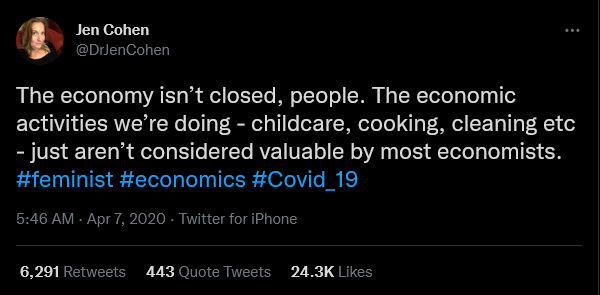 A purple economy
A purple economy  A just, green, feminist COVID-19 response and recovery
A just, green, feminist COVID-19 response and recovery
The COVID-19 pandemic, macroeconomy and women
The spread of the novel coronavirus and the disease it causes (COVID-19) across the globe in 2020 led to drastic changes in our ways of living, working, and socialising. At the time of writing, the virus has caused over 14,400,000 deaths worldwide. Drastic measures have been taken by many governments to contain the spread of the virus, both to reduce the number of deaths and also to prevent economies and health systems from collapsing. Schools and non-essential businesses have been closed, some countries have declared a state of emergency and strict curfews, and international flights have been suspended.
Women are at the centre of the crisis for multiple reasons. First of all, we have discussed that women and girls undertake the majority of care work in their homes and their communities, as well as in formal, paid employment. The pandemic has increased women’s care burden multifold. Due to the increased push for privatised health and care systems, such services are becoming less accessible. This work then falls onto the shoulders of women, who are not supported nor compensated for it.
The fear of health systems collapsing due to COVID-19 is actually the result of decades of neoliberal macroeconomic policies, which pushed for defunding and privatising many health systems throughout the world. As a result, many countries were struggling to meet healthcare needs before the pandemic, with minimal and underpaid personnel and minimum stocks of necessities such as ventilators and personal protective gear. Women make up a greater percentage of healthcare providers at nearly all levels, and they are disproportionately affected by the lack of equipment, funding, and personnel.
In general, the crisis has led many people to rethink the importance of ‘care work’ and ‘reproductive labour’. The professions that have stood out as ‘essential’ in this crisis, are those that ensure the survival of the society, and not those that are highly regarded or highly compensated. While banks and hedge funds had little to provide to the communities they operate in, supermarket workers, migrant agricultural workers, health personnel, cleaners, and many others in low-paid professions helped their communities to get through this crisis, many times increasing their own risks of exposure to the virus.
In many countries, and often due to their care responsibilities, women make up the majority of part-time, informal, and service workers. These include domestic workers, blue-collar workers, sex workers, etc. They are the first ones to lose their jobs in the face of a crisis, such as COVID-19. Furthermore, many countries have supported micro-entrepreneurship projects as a ‘miracle’ solution to female unemployment for years. These small enterprises are the ones that are most at risk during many countries’ lockdowns and quarantine measures, and they will also be less likely to access credit from banks. However, we see that many countries are prioritising support for sectors dominated by big corporations, rather than providing support to the micro-enterprises, which would have supported the women who have fewer safety nets at their disposal.
Even within a month of measures taken by countries to motivate/force their citizens to stay home, we’ve witnessed an increase in domestic violence against women, sometimes as much as 35%. While pre-COVID studies have found that violence against women increases in times of economic crises, this has been exacerbated during the COVID-19 pandemic due to the quarantine measures imposed. Furthermore, normal measures for protecting women and girls against violence (such as shelters) are also affected by the pandemic; they cannot accept as many women as they did before due to social distancing restrictions. Protecting women against violence should be a priority response to such crises.
The pandemic has also become an excuse for especially authoritative states to increase their pressure and violence on the overall population, with women’s human rights defenders becoming one of the first constituencies to be affected.
The COVID-19 pandemic has changed many things in our lives. Feminists came together in the Feminist COVID-19 Response Collective in an effort to respond to these changes and to provide a feminist analysis of responses to the pandemic throughout the world. The Collective has outlined six principles on how a feminist response to COVID-19 pandemic should look, as well as bringing together resources on different responses throughout the world. The principles and the responses can be accessed at its website. The resources section also has a wide range of filters (including the economy) which allows readers to select resources related to the economy in a certain region or country.


